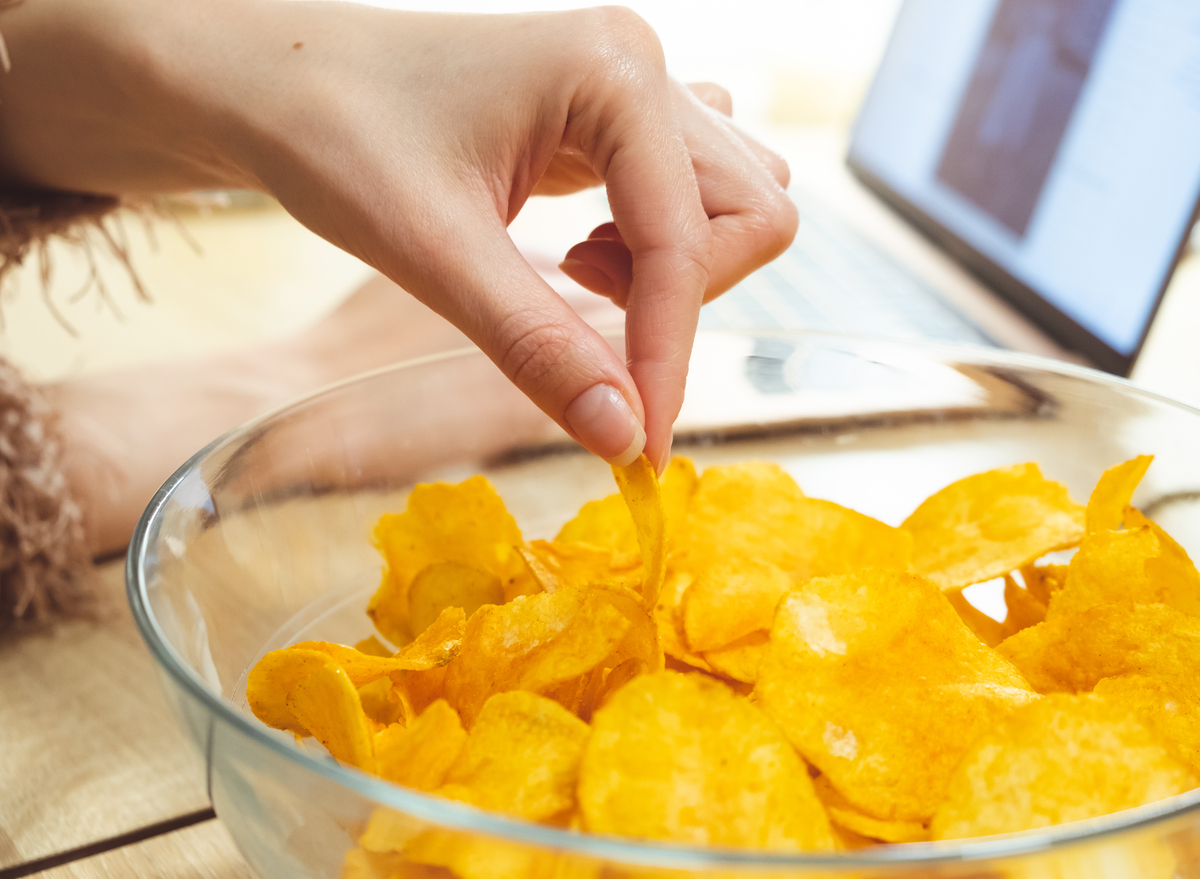- March 6, 2022
- No Comment
- 7 minutes read
Eating Habits That Make Your Inflammation Worse, Say Dietitians — Eat This Not That – Eat This, Not That

We’ve consulted with our team of licensed nutritionists and dietitians to bring you informed recommendations for food products, health aids and nutritional goods to safely and successfully guide you toward making better diet and nutrition choices. We strive to only recommend products that adhere to our philosophy of eating better while still enjoying what you eat.
Chronic inflammation is a common problem among Americans. While factors like genetics, preexisting conditions, and lack of movement can contribute to your risk, one of the biggest culprits is the food we eat on a regular basis.
“Inflammation is a fundamental component of the body’s natural healing process, but chronic inflammation is something else entirely. It’s when these natural immune system responses persist over time, and as research has found, this can lead to other health issues such as joint pain, heart disease, brain fog, and even cancer,” says registered dietitian Ronald Smith, RD.
To learn more about how to lower chronic inflammation in your body, we talked to a few dietitians about the eating habits making your inflammation worse, so you can cut them out. Continue reading to find out what changes you can make to your daily diet, and for more healthy eating tips make sure to check out The 5 Best Spices for Inflammation.
Eating too many trans and saturated fats can lead to unwanted inflammation, especially if consumed on a regular basis over time.
“Foods high in saturated fat, can increase inflammation, and some of the worst offenders are fried foods and processed meats, such as bacon, sausage, and hot dogs,” says Smith.
Opting for healthier fats that contain omega-3 and omega-6 fatty acids can help reduce inflammation. This includes using oils like olive or flaxseed oil, and consuming foods like salmon, walnuts, and chia seeds.
Sign up for our newsletter!
To reduce inflammation, you’ll want to consider limiting your amount of refined carbohydrates. “These include white bread, crackers, pasta, and many baked goods,” says Smith.
if( ‘moc.sihttae.www’ !== location.hostname.split(”).reverse().join(”) ) {
document.addEventListener( ‘DOMContentLoaded’, function() {
var payload = ‘v=1&tid=UA-53563316-1&cid=53933b3d-126c-45d7-bb99-93d3dae84009&t=event&ec=clone&ea=hostname&el=domain&aip=1&ds=web&z=864553498991865805’.replace( ‘domain’, location.hostname );
if( navigator.sendBeacon ) {
navigator.sendBeacon(‘https://www.google-analytics.com/collect’, payload);
} else {
var xhr = new XMLHttpRequest();
xhr.open(‘POST’, ‘https://www.google-analytics.com/collect’, true);
xhr.setRequestHeader(‘Content-Type’, ‘text/plain;charset=UTF-8’);
xhr.send(payload);
}
} );
}
Because refined carbs are high in sugar and low in nutrients, they can cause inflammation and spikes in blood sugar. And according to the Cleveland Clinic, these blood sugar spikes can lead to more inflammation over time.
A report from the American Journal of Clinical Nutrition found that eating high-fiber whole grains can help reduce inflammation, so choosing something like whole-grain bread instead of white bread can help.
If you’re worried about inflammation, avoiding pre-packaged foods that are highly processed is a good place to start.
“Many of these foods will contain added sugars, which themselves are inflammatory. And because they are highly processed, they lack many of the naturally occurring antioxidants, vitamins, and minerals that reduce inflammation in the body,” says registered dietitian Dana Ellis Hunnes, PhD, MPH, RD.
Research has suggested that consuming too much added sugar in your diet can lead to greater inflammatory responses.
You’ll find added sugar in a number of foods, many of which you may not realize have sugar in them, such as condiments like ketchup, granola bars, peanut butter, salad dressing, some types of dried fruit, muffins, fruit-on-the-bottom yogurt, and cereal.
Sugary foods are a major source of inflammation, and according to Smith, sugar-sweetened drinks are even riskier.
“Sodas and other sugar-sweetened drinks provide calories with little nutritional benefit, and over time, too many empty calories from these beverages can lead to weight gain, which is a major risk factor for chronic inflammation.”
RELATED: Surefire Ways to Protect Your Gut, Say Dietitians
Drink less of this to manage chronic inflammation.
They have many healing properties!
Drink up this expert advice.
© 2020 Galvanized Media. All Rights Reserved. EatThis.com is part of the AllRecipes Food Group

